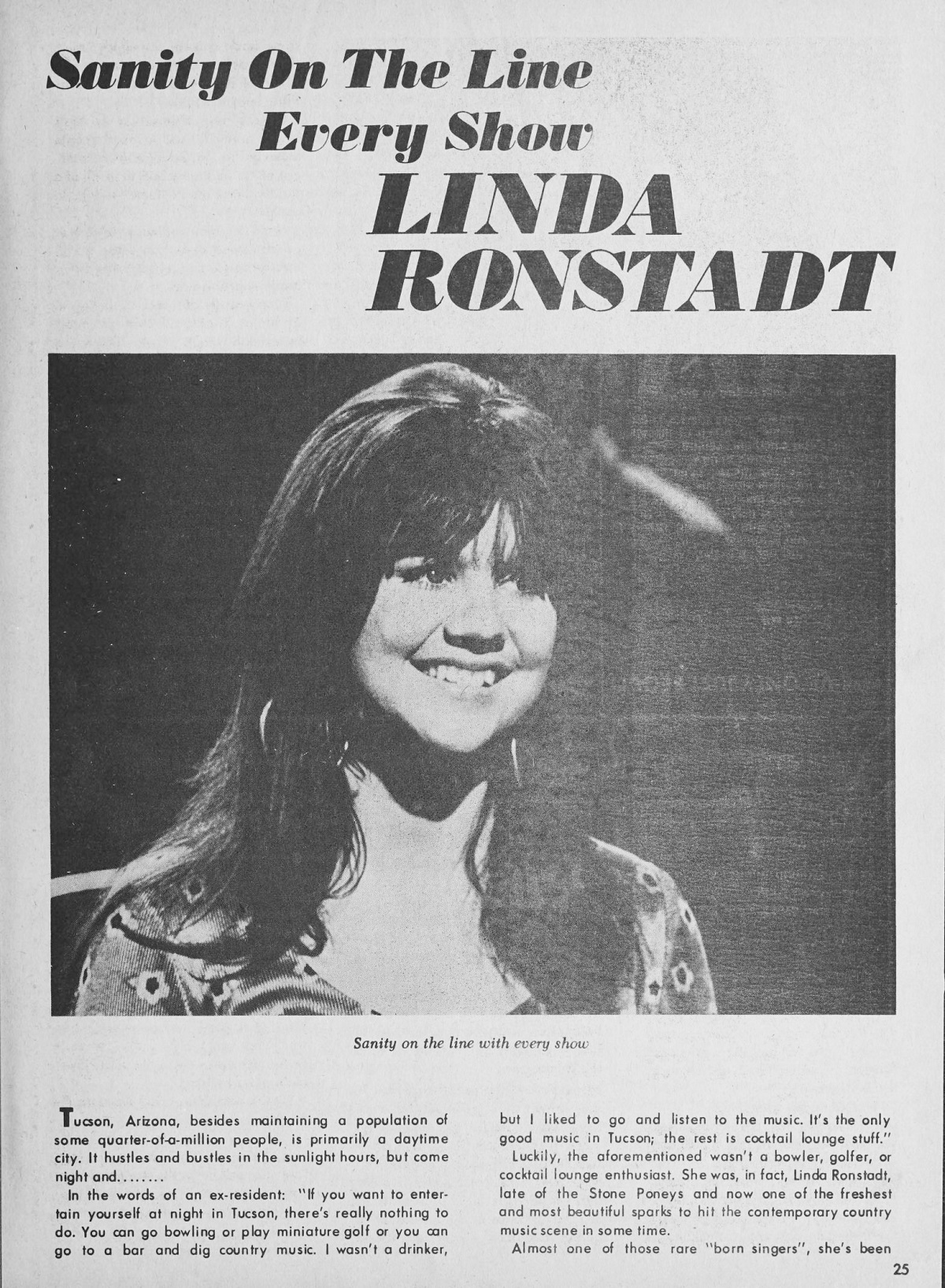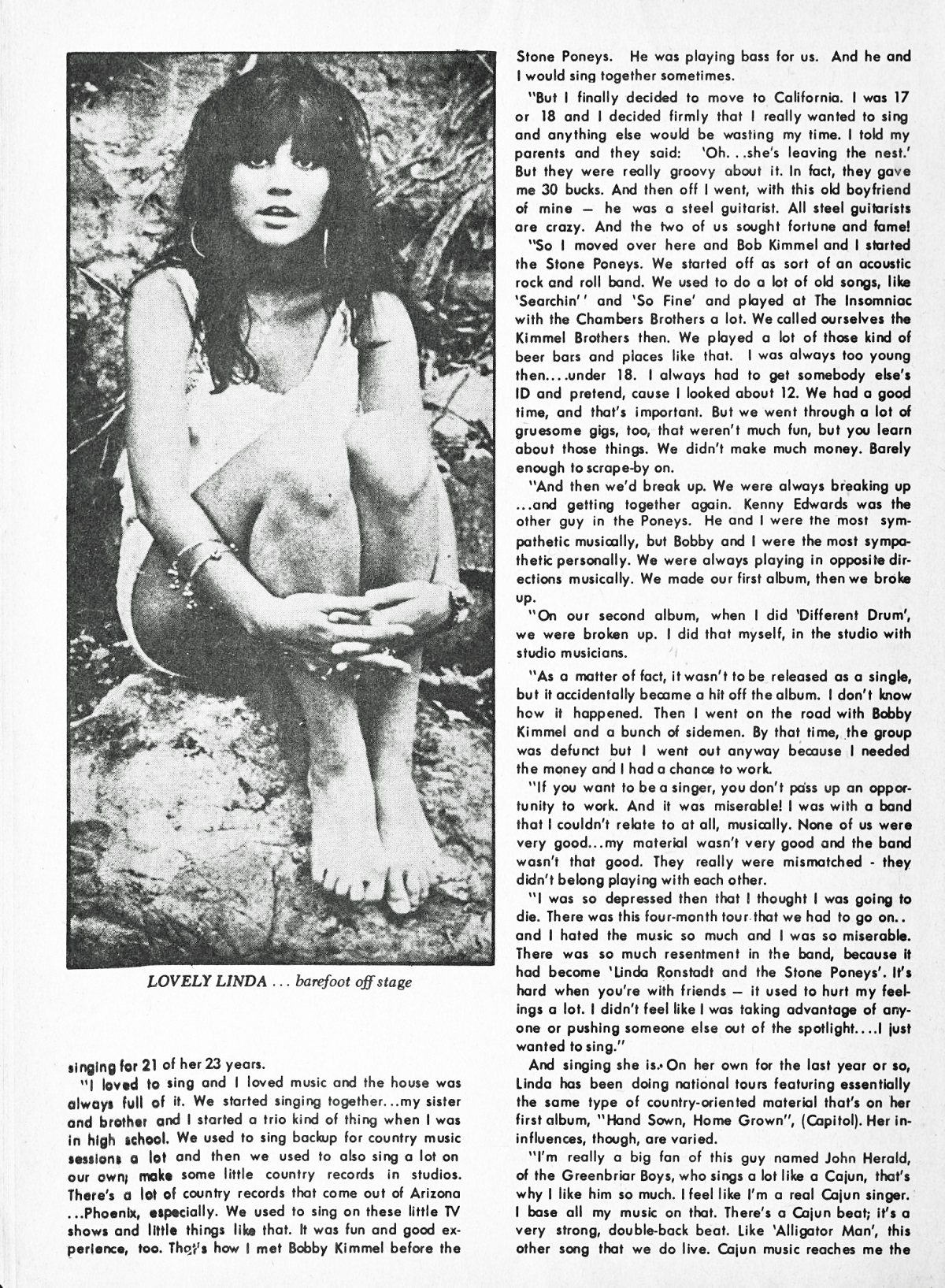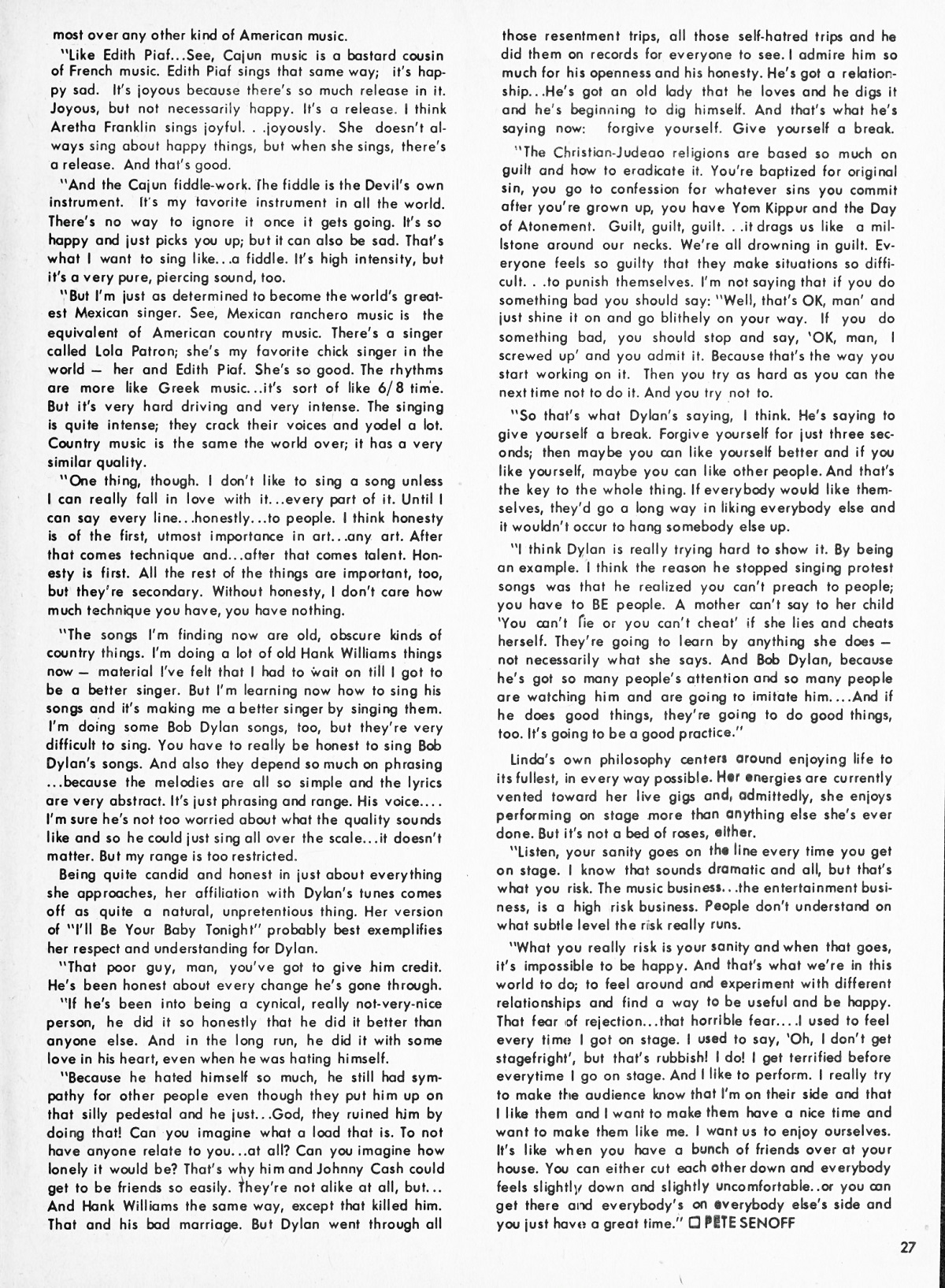Linda Ronstadt
Sanity on the Line Every Show
Hit Parader, February 1971



Thanks to Marsha Burghoff for providing this article.
Tucson, Arizona, besides maintaining a population of some quarter-of-a-million people, is
primarily a daytime city. It hustles and bustles in the sunlight hours, but come night and...
In the words of an ex-resident: "If you want to entertain yourself at night in Tucson,
there's really nothing to do. You can go bowling or play miniature golf or you can go to a bar
and dig country music. I wasn't a drinker, but I liked to go and listen to the music. It's the
only good music in Tucson; the rest is cocktail lounge stuff."
Luckily, the aforementioned wasn't a bowler, golfer, or cocktail lounge enthusiast. She was,
in fact, Linda Ronstadt, late of the Stone Poneys and now one of the freshest and most beautiful
sparks to hit the contemporary country music scene in some time.
Almost one of those rare "born singers", she's been singing for 21 of her 23 years.
"I loved to sing and I loved music and the house was always full of it. We started singing
together... my sister and brother and I started a trio kind of thing when I was in high school.
We used to sing backup for country music sessions a lot and then we used to also sing a lot on
our own; make some little country records in studios. There's a lot of country records that came
out of Arizona... Phoenix, especially. We used to sing on these little TV shows and little things
like that. It was fun and good experience, too. That's how I met Bobby Kimmel before the Stone
Poneys. He was playing bass for us. And he and I would sing together sometimes.
"But I finally decided to move to California. I was 17 or 18, and I decided firmly that I
really wanted to sing and anything else would be wasting my time. I told my parents and they
said: 'Oh... she's leaving the nest.' But they were really groovy about it. In fact, they gave
me 30 bucks. And then off I went, with this old boyfriend of mine- he was a steel guitarist. All
steel guitarists are crazy. And the two of us sought fortune and fame!
So I moved over here and Bob Kimmel and I started the Stone Poneys. We started off as sort of
an acoustic rock and roll band. We used to do a lot of old songs, like 'Searchin'' and 'So Fine'
and played at The Insomniac with the Chambers Brothers a lot. We called ourselves the Kimmel
Brothers then. We played a lot of those kind of beer bars and places like that. I was always too
young then... under 18. I always had to get somebody else's ID and pretend, cause I looked about
12. We had a good time, and that's important. But we went through a lot of gruesome gigs, too,
that weren't much fun, but you learn about those things. We didn't make much money. Barely enough
to scrape by on.
"And then we'd break up. We were always breaking up... and getting together again. Kenny Edwards
was the other guy in the Poneys. He and I were the most sympathetic musically, but Bobby and I
were the most sympathetic musically. We were always playing in opposite directions musically. We
made our first album, then we broke up.
"On our second album, when I did 'Different Drum', we were broken up. I did that myself, in
the studio with studio musicians.
"As a matter of fact, it wasn't to be released as a single, but it accidentally became a hit
off the album. I don't know how it happened. Then I went on the road with Bobby Kimmel and a bunch
of sidemen. By that time, the group was defunct but I went out anyway because I needed the money
and I had a chance to work.
"If you want to be a singer, you don't pass up an opportunity to work. And it was miserable!
I was with a band that I couldn't relate to at all, musically. None of us were very good... my
material wasn't very good and the band wasn't that good. They really were mismatched- they
didn't belong playing with each other.
"I was so depressed then that I thought I was going to die. There was this four-month tour
that we had to go on.. and I hated the music so much and I was so miserable. There was so
much resentment in the band, because it had become 'Linda Ronstadt and the Stone Poneys'. It's
hard when you're with friends- it used to hurt my feelings a lot. I didn't feel like I was
taking advantage of anyone or pushing someone else out of the spotlight... I just wanted to sing."
And singing she is. On her own for the last year or so, Linda has been doing national tours
featuring essentially the same type of country-oriented material that's on her first album,
"Hand Sown, Home Grown", (Capitol). Her influences, though, are varied.
"I'm really a big fan of this guy named John Herald, of the Greenbriar Boys, who sings a lot
like a Cajun, that's why I like him so much. I feel like I'm a real Cajun singer. I base all my
music on that. There's a Cajun beat; it's a very strong, double-back beat. Like 'Alligator Man',
this other song that we do live. Cajun music reached me the most over any other kind of
American music.
"Like Edith Piaf... See, Cajun music is a bastard cousin of French music. Edith Piaf sings
that same way; it's happy sad. It's joyous because there's so much release in it. Joyous, but
not necessarily happy. It's a release. I think Aretha Franklin sings joyful... joyously. She
doesn't always sing about happy things, but when she sings, there's a release. And that's good.
"And the Cajun fiddle-work. The fiddle is the Devil's own instrument. It's my favorite
instrument in all the world. There's no way to ignore it once it gets going. It's so happy
and just picks you up; but it can also be sad. That's what I want to sing like... a fiddle. It's
high intensity, but it's a very pure, piercing sound, too.
"But I'm just as determined to become the world's greatest Mexican singer. See, Mexican
ranchera music is the equivalent of American country music. There's a singer called Lola
Beltran; she's my favorite chick singer in the world- her and Edith Piaf. She's so good. The
rhythms are more like Greek music... It's sort of like 6/8 time. But it's very hard driving
and very intense. The singing is quite intense; they crack their voices and yodel a lot.
Country music is the same the world over; it has a very similar quality.
"One thing, though, I don't like to sing a song unless I can really fall in love with it...
every part of it. Until I can say every line... honestly... to people. I think honesty is of the
first, utmost importance in art... any art. After that comes technique and... after that comes
talent. Honesty is first. All the rest of the things are important, too, but they're secondary.
Without honesty, I don't care how much technique you have, you have nothing.
"The songs I'm finding now are old, obscure kinds of country things. I'm doing a lot of old
Hank Williams things now- material I've felt that I had to wait on till I got to be a better
singer. But I'm learning now how to sing his songs and it's making me a better singer by singing
them. I'm doing some Bob Dylan songs, too, but they're very difficult to sing. You have to
really be honest to sing Bob Dylan's songs. And also they depend so much on phrasing... because
the melodies are all so simple and the lyrics are very abstract. It's just phrasing and range.
His voice... I'm sure he's not too worried about what the quality sounds like and so he could
just sing all over the scale... it doesn't matter. But my range is too restricted.
Being quite candid and honest in just about everything she approaches, her affiliation with
Dylan's tunes comes off as quite a natural, unpretentious thing. Her version of "I'll Be Your
Baby Tonight" probably best exemplifies her respect and understanding for Dylan.
"That poor guy, man, you've got to give him credit. He's been honest about every change
he's gone through.
"If he's been into being a cynical, really not-very-nice person, he did it so honestly that
he did it better than anyone else. And in the long run, he did it with some love in his heart,
even when he was hating himself.
"Because he hated himself so much, he still had sympathy for other people even though they
put him up on that silly pedestal and he just... God, they ruined him by doing that! Can you
imagine what a load that is. To not have anyone relate to you... at all? That's why him and
Johnny Cash could get to be friends so easily. They're not alike at all, but... And Hank
Williams the same way, except that killed him. That and his bad marriage. But Dylan went through
all those resentment trips, all those self-hatred trips and he did them on records for everyone
to see. I admire him so much for his openness and his honesty. He's got a relationship. He's got
an old lady that he loves and he digs it and he's beginning to dig himself. And that's what
he's saying now: forgive yourself. Give yourself a break.
"The Christian-Judeao religions are based so much on guilt and how to eradicate it. You're
baptized for original sin, you go to confession for whatever sins you commit after you've grown
up, you have Yom Kippur and the Day of Atonement. Guilt, guilt, guilt... it drags us like a
millstone around our necks. We're all drowning in guilt. Everyone feels so guilty that they make
situations so difficult... to punish themselves. I'm not saying that if you do something bad
you should say: 'Well, that's OK, man' and just shine it on and go blithely on your way. If
you do something bad, you should stop and say, 'OK, man, I screwed up' and you admit it. Because
that's the way you start working on it. They you try as hard as you can the next time not to
do it. And you try not to.
"So that's what Dylan's saying, I think. He's saying to give yourself a break. Forgive
yourself for just three seconds; then maybe you can like yourself better and if you like yourself,
maybe you can like other people. And that's the key to the whole thing. If everybody would like
themselves, they'd go a long way in liking everybody else and it wouldn't occur to hang
somebody else up.
"I think Dylan is trying real hard to show it. By being an example. I think the reason he
stopped singing protest songs was that he realized you can't preach to people; you have to BE
people. A mother can't say to her child 'You can't lie or you can't cheat' if she lies and
cheats herself. They're going to learn by anything she does- not necessarily what she says. And
Bob Dylan, because he's got so many people's attention and so many people are watching him and
are going to imitate him... And if he does good things, they're going to do good things, too. It's
going to be a good practice."
Linda's own philosophy centers around enjoying life to its fullest, in every way possible. Her
energies are currently vented toward her live gigs and, admittedly, she enjoys performing on
stage more than anything else she's ever done. But it's not a bed of roses, either.
"Listen, your sanity goes on the line every time you get on stage. I know that sounds dramatic
and all, but that's what you risk. The music business... the entertainment business is a high
risk business. People don't understand on what subtle level the risk really runs.
"What you really risk is your sanity and when that goes, it's impossible to be happy. And
that's what we're in this world to do; to feel around and experiment with different relationships
and find a way to be useful and be happy. The fear of rejection... that horrible fear... I used
to feel every time I got on stage. I used to say =, 'Oh, I don't get stagefright', but that's
rubbish! I do! I get terrified before everytime I go on stage. And I like to perform. I really
try to make the audience know that I'm on their side and that I like them and I want to make
them have a nice time and want to make them like me. I want us to enjoy ourselves. It's like
when you have a bunch of friends over at your house. You can either cut each other down and
everybody feels slightly down and slightly uncomfortable... or you can get there and everybody's
on everybody else's side and you just have a great time."
P E T E S E N O F F





